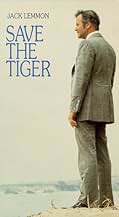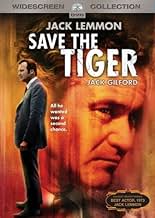El problemático fabricante de ropa Harry Stoner intenta que su fábrica llena de deudas, sobreviva, contrata a un alguien para que queme un edificio y así Harry pueda cobrar el dinero del seg... Leer todoEl problemático fabricante de ropa Harry Stoner intenta que su fábrica llena de deudas, sobreviva, contrata a un alguien para que queme un edificio y así Harry pueda cobrar el dinero del seguro.El problemático fabricante de ropa Harry Stoner intenta que su fábrica llena de deudas, sobreviva, contrata a un alguien para que queme un edificio y así Harry pueda cobrar el dinero del seguro.
- Dirección
- Guionista
- Elenco
- Ganó 1 premio Óscar
- 2 premios ganados y 5 nominaciones en total
- Ula
- (as Liv Von Linden)
- Tiger Petitioner
- (as Biff Elliott)
- Model
- (sin créditos)
- Dirección
- Guionista
- Todo el elenco y el equipo
- Producción, taquilla y más en IMDbPro
Opiniones destacadas
really did have the everyman down to a science. The movie is an excellent
commentary on dreams coming apart, the loss of old friends, and realizing
youre time may have come and gone. Not exactly the most uplifting movie but it is raw and honest. Lemmon and his partner run Capri Casuals, a women's wear
line based in southern California in the early 70's. (incidentally the name comes from the island where most of Lemmons war time buddies were killed and
buried) When times get tough and Lemmon is lowering himself by becoming a
pimp to a big customer, he realizes his American dream might be over. In
consultation with his partner he decides to hire an arsonist to destroy his factory for the insurance. An intense, searing performance from Lemmon, makes Save
the Tiger a movie that should be watched for years to come.
Highly Recommended.
Jack Lemmon delivers a brilliant, Oscar-winning performance as Harry Stoner, a middle-aged man at the end of his tether, who confuses his personal midlife crisis, and the failure of his fashion business, with what he sees as the USA's moral decline in the post-war years. Obsessed with the lost cameraderie of his active service in the war, with the baseball and jazz giants of yesteryear, and with the slain and fallen idols of the 60s (Kennedy, King, Monroe etc), he sleepwalks into his own moral abyss of an arson plot, comforting himself that he is no worse than the times in which he lives.
Lemmon's character is countered by those of Phil Greene, his business partner, convincingly played by Jack Gilford, and Meyer (William Hansen), the firm's veteran, expert cutter and refugee from Nazism. Phil does not suffer Harry's sense of disillusion, because he is too down-to- earth to have experienced the illusion in the first place; Meyer, also, despite superficial discontent with the changing times, gains strength from his skill and family life.
For me, the main theme here is the familiar one of the lost American Dream, and the film brings to mind the final lines of the seminal exploration of that theme, the Great Gatsby - "So we beat on, boats against the current, borne back ceaselessly into the past." Harry's American Dream is not of a golden future, but of a golden past; it isn't lost, it simply never existed. But, that said, in this movie thematic analysis definitely takes second place to appreciation of Lemmon's bravura performance.
Little did I know, that thirty years later, I would be going through one of my own and would once again be drawn to, and struck by, the sincerity and integrity of Jack Lemmon's performance.
The film has it's critics, self indulgent, sentimental and simplistic are only some of comments made, but the film still has the power to make you question what you have done with your own life. It asks you how you got to where you are, and it makes you ask yourself if it was all worth it. It also questions/exposes the Great American Dream and asks, if that is not the be all and end all, then what is?
Harry Stoner is not a man you should feel sorry for, but Lemmon's interpretation forces you to question his ideals and your own, as you follow this crisis point in his life. In the end, whether you like the film or not, or agree with what it is trying to say, you can't deny Lemmon his Academy Award.
He plays Harry Stoner, owner of an heavily indebted ladies designer clothes manufacturing company. The film covers just 2-3 days of his life and we get a pretty good idea of his sad existence in the urban jungle and what he has become - no longer a good, decent person fighting for the right cause. There are references to Stoner's war record and patriotism throughout the film. The fact that the US was fighting the very unpopular Vietnam war could have influenced the themes of this film.
There is little in the way of plot but there is a rich characterization made deeper by the crises in Stoner's life and Lemmon's excellent depiction of a man who is cracking at the seams. My favorite scenes were the ones in the car with the hippie girl towards the beginning of the film and the question she asked him and Lemmon's comic reaction....
I believe the strength of this film is that his performance allows it to strike a multi-generational cord with viewers...a key theme of the movie is the way the world has changed since they way we remembered it when we were younger, which I think is a pang that all of us get, no matter what age. The world always seems darker and more complicated now and concept that needs no real transposition between eras.
Harry Stoner is a man of his times...swing bands, baseball, and World War II. His life is still influenced by all three, but only in quick flashes of fond memories or flashbacks of a beach in Italy. Lemmon gives us a character that does what he has to do in order to maintain what he has worked for, and that rationalizes that which may or may not be quite on the up-and-up.
Jack Gilford is excellent as his partner in Capri Casuals, representing a voice of conscience that is not quite as blind to circumstance as Jack's character, and there are several other good performances in the film. Jack Lemmon stands out, as he does in most films, and richly deserved the Academy Award for this one.
¿Sabías que…?
- TriviaActor Jack Lemmon waived his usual fee and worked for scale plus a percentage of the gross. Scale was US $165 a week at the time.
- ErroresHarry wipes Fred's face almost completely clean of the red body paint. In a subsequent shot, Fred's face is covered with red paint again.
- Citas
Myra: Are you OK? Do you want something?
Harry Stoner: Yes. I want that girl in a Cole Porter song. I wanna see Lena Horne at the Cotton Club - hear Billie Holiday sing fine and mellow - walk in that kind of rain that never washes perfume away. I wanna be in love with something. Anything. Just the idea. A dog, a cat. Anything. Just something.
- ConexionesFeatured in Paramount Presents (1974)
- Bandas sonorasAir Mail Special
Composed by Jim Mundy, Benny Goodman & Charlie Christian
Selecciones populares
- How long is Save the Tiger?Con tecnología de Alexa
Detalles
- Fecha de lanzamiento
- País de origen
- Idiomas
- También se conoce como
- Rettet den Tiger!
- Locaciones de filmación
- Productoras
- Ver más créditos de la compañía en IMDbPro
Taquilla
- Presupuesto
- USD 1,000,000 (estimado)
Contribuir a esta página


































